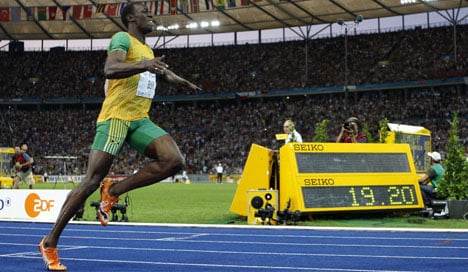The new mark bettered his own previous record of 19.30sec set in the 200m final of the Beijing Games last summer. The performance in front of a stunned capacity crowd at the Olympic Stadium caps an amazing few days for Bolt, who will be 23 on Friday and has the chance of adding a further gold to his medal haul in the 4x100m relay.
The Jamaican smashed his own 100m record when he ran 9.58sec to take gold in that event on Sunday and showed again on Thursday that he has no rivals even close to challenging him when he is in his prime.
“I never expected a world record tonight,” said Bolt. “I was really tired but I told myself I had to just try and do my best – now I am tired. I was too upright. It wasn’t a good race, but it was a fast one.”
The chicken nugget-loving Bolt had an electric start, firing past Panama’s Alonso Edwards on his outside within his first four paces.
Head bowed around the bend, Bolt came out strongly into the final stretch so far ahead of his rivals that the only question was whether he’d be able to break his record. He did not disappoint, his languid style powering his towering 6ft 5in physique through the line a good 10 metres ahead of any others in the field.
Edwards won silver after clocking 19.81sec with Wallace Spearmon (19.85) claiming another bronze to add to his Osaka 2007 bronze and Helsinki 2005 silver.
American Shawn Crawford and Jamaica’s Steve Mullings also ran sub-20sec times of 19.89 and 19.98sec respectively. Azerbaijan’s Ramil Guliyev finished seventh in 20.61sec with Alerte last at 0.07.
Bolt came into the stadium with “Ich bin ein Berlino” scrawled on his warm-up t-shirt and indulged in some horseplay with the willing Spearmon. As the television cameras panned around to his lane five, Bolt adopted a serious pose, arms crossed, staring at the camera until wilting and bending in to check his hair and shave, to the crowd’s delight.
A false start by Frenchman David Alerte did not upset his concentration and once out of the blocks, the unstoppable Jamaican was away and en route to writing his name into the athletics history books.



 Please whitelist us to continue reading.
Please whitelist us to continue reading.
Member comments